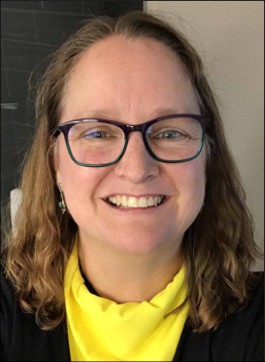
During a recent career panel discussion at Salesforce, one of my colleagues quipped, “I’m probably Salesforce’s oldest intern.” There were some chuckles. A few smiles. And then it occurred to me that Michelle Chapman-Thurber, Principal Technical Writer, started out in the profession later than most. Based on her incredible writing skills, acute attention to technical details, and her role leading critical initiatives, such as the @salesforcedocs Twitter handle, it never crossed my mind that she started at Salesforce as a 41-year old intern.

I asked, “What led you to Salesforce?”
In 1989, Michelle graduated with a BS in Communications and entered a bleak economic recession. Burdened with student loan debt, she couldn’t participate in unpaid internships, so she took a clerical job that eventually led her to Nortel Networks in the Bay Area. “I managed contract support for companies who used our software and hardware. They were entitled to free upgrades if their CDs were lost in the mail.” As the Internet developed in the early 1990s, Michelle investigated how customers could download software updates instead of waiting for CDs to arrive at their offices. She spearheaded the program and was in charge of it for Europe and the East Coast until the dot-com bust of 2001. Nortel let her go.
Since she worked on website design at Nortel, she used those skills to build websites for real estate agents. “It was fun but it didn’t bring me joy. Everyone wanted everything right now and they wanted it for free.” She became pregnant and took five months off from her independent gigs. With a second child arriving, and her husband lucky enough to support their growing family, she became a stay-at-home mom for five years.
Before she returned to the workforce, she gave a lot of thought as to what she enjoyed in her previous jobs. At Nortel, she was a “lucky sucker” assigned to write documents about ISO 9000 — international standards on quality management and assurance. With no training for the project, she interviewed coworkers, learned how they did their jobs, and documented their activities. “Everyone hated it, but I loved it and had a great time.” While researching if she could turn similar work into a career, she discovered that technical writing is a profession.
Michelle learned that nearby De Anza College offered a certificate in technical writing, and she spent a year and a half at night school to earn it. What motivated her to return to school was that most job postings for technical writing required at least six years of experience, and she wanted an edge with education. During the last semester of the program, an instructor sent an email, stating that Salesforce had an internship available.
Age wasn’t a consideration: “Honestly, I didn’t think about age much because I was gung-ho to get into the profession. I had a lot of business experience under my belt. I figured out that would be to my benefit.” She applied for the internship and interviewed for it as if it were a real job. “I saw it as at least practice for other interviews.”
With no expectations, Michelle was surprised that she was offered the internship — and she learned that it was a paid internship. That same week, her husband was laid off from his job. “The internship saved us.” From her experience, she assumed that once the internship ended in three months, she would have to look for work elsewhere. Michelle was thrilled when Salesforce offered her a full-time job.
In the past 10 years on the Content & Communications Experience team (we’re the team that creates the user interface text, feature callouts, videos, graphics, online help, release notes, Trailhead, and more), Michelle has become a well-established leader. It surprises most of her teammates when they hear that she entered Salesforce and the writing profession as an intern in her forties. When asked what lessons she’s learned from the experience, she mentioned:
- Don’t sell yourself short. Don’t assume people won’t want you because you’re not the fresh face out of college. You have skills you don’t even realize.
- Be proud of yourself. Look at what you’ve done, and sell yourself to who you’re interviewing with — your body of work, not your background. Sell your skills, not your background.
- A degree and school only take you so far. People look at what your skills can do for them, not your degree. My degree was video and film production, which doesn’t have much to do with technical writing.
- Learn the skills you need from work, not college. I went to a good school, but it didn’t apply. I learned the skills I needed from work, not college.

When asked about her career change, Michelle said, “I thought I’d work to earn money to have fun after work. I feel like I’m the privileged few who goes to work, enjoys it, and gets paid for it. I feel lucky. I love writing. I love the company. I love my coworkers.”
Michelle’s advice about applying for a job at Salesforce is: “Do your homework. Study the company. Ask questions about the company in the interview. Be yourself. Try not to oversell yourself — they are interviewing you for your skills as much as how you fit into the culture.”
Michelle claims that she’s always had a strain of optimism and never wallows in misery. She’s had her bouts of pessimism and knows that life is not all rainbows and unicorns. “It took me a long time to have pride in my accomplishments. I had problems with self-esteem as a teenager, and I had to get over it. I struggle some days with an extreme case of impostor syndrome. I think everyone does. Keep doing your best work and things will go your way.”
Thinking about changing or jumpstarting your career? Check out the Career Development Planning and Interview Strategies modules on Trailhead. Or, if you’re interested in a role at Salesforce, apply today! We’re hiring.





